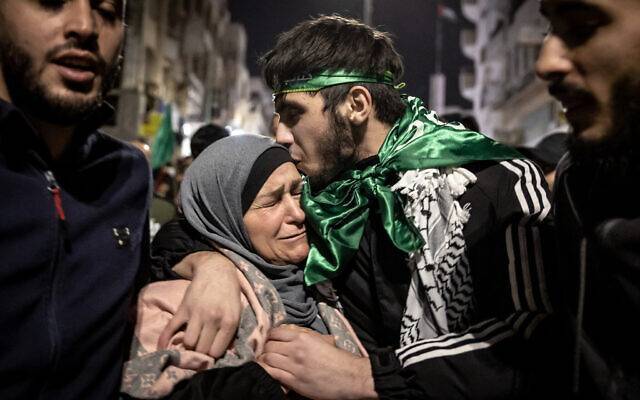
Palestinian security prisoner Omar Atshan hugs his mother after being released from an Israeli jail, Ramallah, Nov. 26, 2023. (Credit: Fadel Senna/AFP)
Since the start of the truce between Hamas and Israel, the release operations outlined in the agreement have been accompanied by a semantic distinction.
On one side, there are the "hostages" held by Palestinian fighters, and on the other, the "Palestinian prisoners" incarcerated in Israeli jails.
According to international law, hostage-taking is defined as the act of capturing or holding one or more persons with the threat of harm or continued detention to compel a state or group to take specific actions or refrain from certain activities, which constitutes a war crime, according to international lawyer Johann Soufi via X (formerly Twitter). In some instances, it may also be considered a crime against humanity.
While the term is appropriately used to describe the fate of the 240 individuals (including some foreigners) abducted by Hamas on Oct. 7 and trapped in the Gaza Strip for over 50 days,, there are differing views on using the term "prisoners" for the 300 Palestinians listed by Israel as candidates for release under the truce agreement, with 287 of them children under the age of 18.
Many of these individuals were arrested less than a year ago.
"Some voices argue this is a hostage exchange, not hostages for prisoners,” said Palestinian [producer and storyteller] Jenan Matari on her Instagram account. “[This was] an exchange of hostages for hostages.”
“Words matter,” she added, denouncing what she perceives as media-driven doublespeak.
Another internet user commented on Matari’s post saying that "Palestinians are kidnapped and imprisoned by the Israelis with the aim of inspiring fear, imposing their power and inflicting torture on prisoners and their families."
Since Oct. 7, there have been 3,260 new arrests in the West Bank and East Jerusalem. On Monday, Israeli authorities conducted raids on homes in the occupied West Bank, resulting in the arrest of at least 56 Palestinians, as reported by various sources cited by the Palestinian agency WAFA.
According to Palestinian Authority Prime Minister Mohammad Shtayyeh, Israel's increased repression is perceived as a strategic move to provide Hamas with a "low-cost" bargaining chip for the return of Israeli hostages.
"Israel is arresting as many people as possible, simply because it is preparing for such a deal," Shtayyeh said last week.
Administrative detention
Some 117 Palestinian prisoners have been released. Meanwhile, 58 hostages abducted in Israel have left the Gaza Strip.
The prisoners released by Israel include women and male minors, with many aged between 16 and 18. Most of them had been held for less than a year on charges of "stone-throwing" or "breach of security."
They are part of the 6,809 "security prisoners" held by Israel as of Nov. 1, according to data from the Israeli human rights group HaMoked.
Among these prisoners, 2,313 Palestinians are serving a prison sentence based on a judgment; 2,321 have not yet been sentenced by a court; 105 are classified as "unlawful combatants" arrested during the attacks carried out by Hamas on Oct. 7 in southern Israel, and 2,070 are in administrative detention.
The use of administrative detention, applied on an exceptional basis by order of the regional military prosecutor, is currently under fierce criticism as it could be perceived as a form of collective punishment.
Inherited from the British Mandate in Palestine, this military order allows the Israeli army to arrest individuals — primarily Palestinians — for a renewable period of one to six months without trial or official mention of the offense, based on the grounds that the person might consider breaking the law in the future.
"In practice, this allows Israel to incarcerate Palestinians for years who have not been found guilty of anything," according to B'Tselem association, an Israeli information center on human rights in the occupied territories.
In the vast majority of cases, prisoners are also transferred to Israel, a procedure that contravenes international law, which stipulates that persons charged or convicted by the occupying authorities must be detained in the occupied territory.
In the third group of Palestinian prisoners released on Sunday, which included six women and 33 young men, CNN reported that 24 individuals were released from administrative detention.
Among them was Salah Hammouri, the renowned French-Palestinian lawyer who has become a symbol of the Palestinian struggle for fair justice. He was placed in administrative detention in 2005 for three years, and subsequently, twice consecutively in later years.
His situation took a turn in 2022 when, while still in prison, Israeli authorities expelled him from Jerusalem on Dec. 18.
Torture
The application of this procedure, criticized by Amnesty International as arbitrary and primarily employed by Israel to "implement its apartheid system against the Palestinians," appears to have intensified since the Oct.7 attacks, marking the start of a new war waged by Israel in the Gaza Strip.
Previously, 1,310 Palestinians, including 146 minors, out of the 5,000 Palestinians imprisoned, were held under this law.
The 2,700 Palestinians arrested since the start of the war have been arrested "arbitrarily for many of them, and with widespread recourse to administrative detention,” according to the Palestinian Prisoners Society.
Amnesty International denounced the increase in the number of prisoners which has been accompanied by a worsening of detention conditions.
A month after the war broke out, Amnesty International warned of an increase in "cases of torture" and "other ill-treatment" over the past four weeks.
These include violent beatings and humiliations inflicted on detainees, including forcing them to keep their heads down, kneel on the floor while counting detainees and sing Israeli songs, according to the international human rights organization.
This article was originally published by L'Orient-Le Jour. Translation by Sahar Ghoussoub.